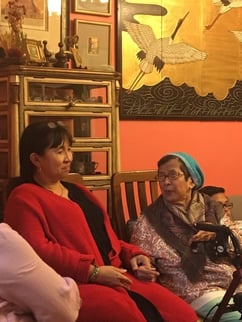 Lola's story is my story; it's my students' story, too.
Lola's story is my story; it's my students' story, too.
Lola's Story
“And the government official told us ‘You are taking a test today.’ It was the teaching exam but we did not know. Over one hundred of us took it in Manila. Ten of us passed to achieve certification.”
My lola (Tagalog for “grandmother”) is sharing her teacher certification story with me at her ninety-ninth birthday party. “Anna, you have taken up my profession.” She smiles as she pats my hand and continues, “It was during the Japanese occupation of the Philippines. I taught the Pilipino language, but the occupying forces wanted me to teach Japanese. Every night a Japanese cook would graciously teach me so I could go to school and teach my students the next day.”

While learning the language of the dominant culture is a common survival strategy for oppressed peoples, how did my grandmother hold on to her identity as a teacher and Filipina? Teachers and students of color are faced with the question of assimilation as an act of survival every day; schooling for compliance takes place too often instead of schooling for learning, growth, and agency, despite what are often good intentions. Here’s the problem that Lola faced, that I have often faced, and that so many students face every day: there is always some degree of assimilation deemed necessary to successfully interact with a dominant culture. And we must admit that one of the primary purposes of schools is to enculturate students into that dominant culture. But how much adaptation and assimilation is too much? Why must the American dream cost students and teachers in our schools our cultural identities in full or in part? We understand the need to adapt and we know the need to retain our cultural identities. How can we be full participants in school AND retain our cultural identities?
My Story
Despite the decades and context that separate our lives, my teaching story echoes my grandmother’s. Unlike Lola, I’m not quite at peace with being known for experiences with adversity. Most often I find myself uncomfortable when labeled “that Katrina teacher”—the one who lived and taught in Lafitte, Louisiana, during, before, and after Hurricanes Katrina and Rita created chaos and devastation.
Recently a colleague introduced me to a large group like this: “And Anna was the best thing that came to us as a result of Hurricane Katrina.” In a flash, I was tossed back to 2005, and the pity on people’s faces and in their behavior (albeit I believe often unintentionally and without malice) diminished my sense of competence and reframed my identity as someone in need rather than someone with gifts to share. Perhaps my discomfort arises because I have worked so hard to fill my personal and professional life with the bounties this difficult time in my family’s history has afforded us—to make the move worthy of the losses we endured, much as Lola did. Perhaps because after twelve years, there are still days when I miss and feel guilt over leaving my family and students when we made the difficult choice to move. As a woman of color—two identities that have given me both moments of intense pride and uncomfortable targeting—I am keenly aware that an identity like that Katrina teacher, while often used without harmful intent definitely can become a deficit label.
I think I’ve grown into someone who reacts to deficit labeling with a need to shift the conversation to assets, both for myself and for my students. Early in my new job when my principal walked into my room to say, “Tomorrow, you’re getting two students who don’t speak English,” I had a sense of panic and incompetence. It was a situation setting me and my students up for failure. I didn’t know what I felt I needed to know to teach these students, so I did my best in the moment, which involved lots of reading and conversations with people who knew more about ELs than I did. The experience led me to getting certified to teach English learners.
Now I say “no” to situations that make me or my students feel “less than” by finding the strengths that already exist in our identities and move forward from that to greater strength. I have a strong foundation in good literacy instruction and I’m a good learner. If I’m not quite the teacher I want to be today, I can become closer to that teacher tomorrow. Am I angry at unreasonable expectations and how the disadvantaged students who need the most support often are least likely to receive it? Of course. I believe the system needs to be changed, so I start with myself: how can I hold on to the integrity of my identity in an adverse situation? How can I grab on to my power as a human being and a teacher and my students’ power when people are trying to take it away? My connection with my grandmother reminds me that I come from people of strength and my connection with my students reminds me that respecting them requires I respect myself.
My Students' Story
It’s early September 2017, and Hurricane Harvey is taking aim at the best laid plans of Texas teachers’ new school year. I find myself unable to bury memories of Katrina in teacher busy work. When my advisory students tell me they want to raise money for hurricane relief, I take a deep breath and share my story with them. It isn’t easy, but in my last Fellows blog, I talk about the power of saying yes. Like the tough work of teaching, saying yes to sharing our identities isn’t easy, but it’s a sign that we respect who we are and that students’ identities—their full selves—are worthy of sharing and exploring in school. If we don’t invite these conversations, then we’re asking them to comply instead of talking back and letting us know what feels uncomfortable, compromising, or diminishing. If they aren’t invited to name what challenges their identity, they cannot grow and risk losing hold of what matters most to them.
My students and I are discussing stereotypes. After we watch the YouTube video “Silent Beats,” I ask, “How do people stereotype us as readers and learners?” The discussion is rich and revealing: many of my students share how someone else’s label or assumption became their own pain or embarrassment. Toward the end of the day, three of my students approach me: “We have to do something. Can we make another vlog post to teach people that they shouldn’t assume things because we’re in a reading [intervention] class? Maybe we can make posters too.” I wholeheartedly approve of their plans, and when they walk away to plan their film, I realize we are moving from adaptation and exploration of identity to an exercise in agency. They are speaking back to those who say reading intervention means less than and using their literacy skills to do so. They are synthesizing an unpleasant reality—they struggle with reading—with a new awareness of their own value and power when using literacy tools. They’re casting off the shame of the deficit label and demanding to be seen as more than by their community.
•••
My grandmother was in a situation with limited control, real danger to her physical self. How could she meet the compromise required of her situation with respect for herself and others? Every member of a community faces this question. Every teacher faces this question. Every student faces this question. As teachers, it’s our responsibility to respect ourselves enough to answer the question fully for ourselves and to create opportunities for our students to answer the question for themselves. I cannot immediately change all the systems that create adversity and disempower children in our country, but I can create momentum for that in myself, in my classroom, and for my students. If we come from adversity—imprisonment, poverty, a labeled skill deficit—we still have strength and value. We can learn and grow without casting off our past identities as not having value.
As a teacher, I have always aspired to be my lola. Her dedication to her students is the stuff of family legend. I want the same strength she showed in a difficult time for both my students and myself as we face the unknowns life will bring. In exploring the interwoven threads of our stories, I realize that before my Fellows journey, I was going about it all wrong. I mistakenly thought the key for my students and myself was to eschew the identities that cause us discomfort, to avoid the deficit labels others put upon us. I now realize I must make space in our classroom to share our vulnerabilities so that we can move beyond the shame of those labels, ultimately allowing us to reclaim our identities as part of who we are and can become.
 Anna Osborn felt the call to education after watching a news report on the need for teachers. More than 15 years later she still wakes up every morning with a passion for making a difference for her students. “Teaching is not for the fainthearted. There are unexpected tragedies and life changes that happen, yet, teachers hold an ethical and personal commitment to our students.” She is a Reading Specialist at Jefferson Middle School in Columbia, Missouri.
Anna Osborn felt the call to education after watching a news report on the need for teachers. More than 15 years later she still wakes up every morning with a passion for making a difference for her students. “Teaching is not for the fainthearted. There are unexpected tragedies and life changes that happen, yet, teachers hold an ethical and personal commitment to our students.” She is a Reading Specialist at Jefferson Middle School in Columbia, Missouri.


